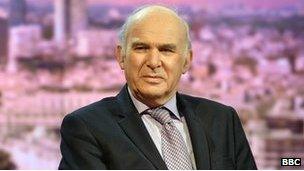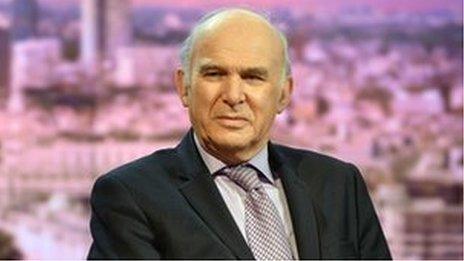Scottish independence: Trading Places
- Published

Vince Cable has released the latest analysis paper on the impact of a yes vote
While businesses live with constant change and risk-taking, they're not noted as enthusiasts for the political and constitutional variety.
That's why the Department of Business, Innovation and Skills (BIS), headed by Vince Cable, has thrown the kitchen sink full of doubts, risks, extra costs and sundry concerns in the way of the business case for independence.
The process didn't get off to a good start, when it was pre-leaked that roaming charges on mobile telecoms could skyrocket if Scotland were in a separate country from the rest of the UK.
Had no-one at BIS noticed that the European Union has been bearing down on this? European regulation of the telecoms industry is, rather slowly, bringing down continental roaming charges.
It was an odd choice to highlight, as there are plenty other things in this report that could have been picked to inject a bit of fear factor into those business people who say (see the Scottish Chambers of Commerce last month) that they're eager for information on independence.
Let's see how many have the patience to plough through 129 pages.
As with the other Whitehall papers on Scotland, if you can see beyond the propaganda value to their authors, they offer some interesting insights into the Scottish economy, and the way Whitehall thinks. It doesn't often publish this level of analysis.
Parallels with the 49th parallel
The main theme from this BIS report is that bigger markets are better for business. That's not such a controversial notion. But underlying most of the paper is the idea that the border will throw up barriers and costs and be bad for business.
The best reference points for this are, of course, other countries, where different laws, regulation and various barriers to trade are an impediment to selling into export markets.

Roaming charges on mobile telecoms was an odd choice to highlight
As I've reported before, the best researched trading border is between the US and Canada, where economists reckon there could be 44% more trade if they were one country, with the same currency, regulation, culture and shared customer loyalties.
While there's a "border effect" analysis yet to come from Whitehall, this week's paper offers brief analysis of the barriers faced by companies in Northern Ireland which trade south of the border with the Republic.
It cites the cost of simply keeping abreast of changes in legislation and regulation, having different VAT rates, the cost of insuring commercial vehicles to operate in the two countries, the repetition and duplication of having to provide data and the regulation and accreditation of qualifications, for instance in the construction industry.
That's quite apart from the cost, in the Irish case, of operating in two currencies, which is surely the highest trading cost of all.
Cross-Cheviot trade
However, what the BIS report underplays is that most such examples are starting from a position of being protected. The European Union, as with other trading blocks, is about a long process of breaking down existing barriers.
The proposition with Scottish independence is that a highly integrated economy would be run by separate governments. The creation of barriers which don't currently exist would have to be by deliberate choice of one government or the other.
That's not to say that barriers can't be thrown up by the divergence of Scotland from the rest of the UK, including different legislation, on labour markets, for instance. Divergence is surely what independence is about. If not, what is it for?
And the inference of the paper is that the importance for Scots of continuing to sell into the Rest of the UK (RUK) export market is considerably greater than the interests of the English, Welsh and Northern Irish to keep the Scots sweet.
Scots sell twice as much to the RUK in goods and services than we do to everywhere else put together.
Aviation regulators
The Scottish market is important to the RUK, as current trade flows currently appear.
Only the USA is a bigger single export market than Scotland. But it's not nearly as important as cross-Cheviot trade is to Scotland. So in terms of co-ordinating changes in law and regulation, that puts Scotland at the negotiating disadvantage.
That disadvantage is repeated several times in Vince Cable's departmental paper.
It doesn't quite spell out how awkward Whitehall might choose to be in independence talks, but it's not assuming things will be as full of goodwill on sharing institutions from aviation regulators to the vehicle licensing agency as the pro-independence side prefers to think.
For instance, when discussing SNP plans to keep the corporation tax permanently lower than that of the UK, BIS observes: "This cannot be guaranteed if the intention is to negotiate a formal currency union with the continuing UK."
You can see a pretty robust negotiating position taking shape there.
Clyde-built negotiations
And that brings to mind the proposal from the SNP that it would buy patrol boats from Clyde shipyards. That makes sense from a military point of view, because, the way things stand, Scotland is not the base to much of a surface fleet.
But it's a brave negotiating tactic to tell BAE Systems, the owners of the Govan and Scotstoun yard, that there's a political commitment to build ships that are still being designed and not yet costed.
The UK government has struggled for years to get down the costs of military procurement, and failed far too often. Between Whitehall's Ministry of Defence and BAE Systems, the balance of negotiating power is more finely balanced; both sides need each other.
It's less clear that BAE Systems has as great a need of orders from an independent Scottish government.
So if the political pledge to buying from the Glasgow yards is in place, the firm will be able to name its price.
- Published2 July 2013

- Published30 June 2013
